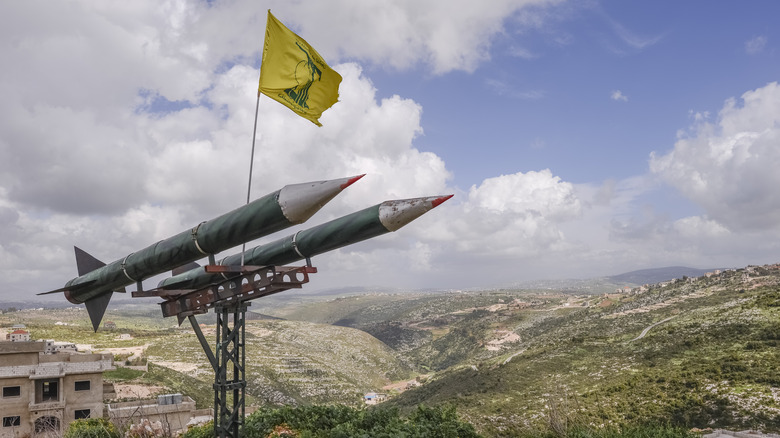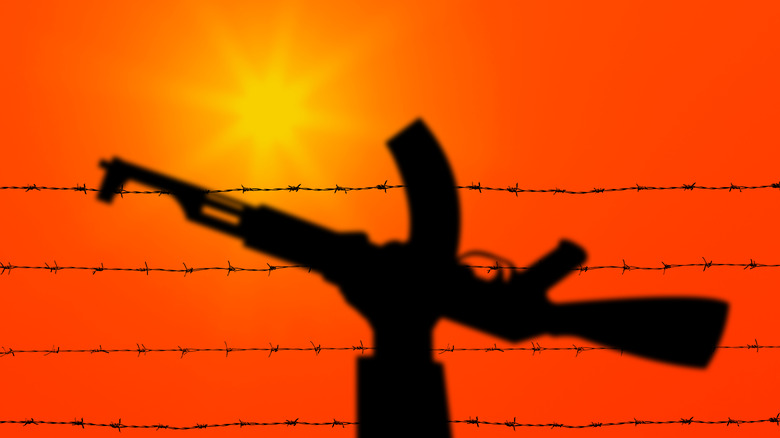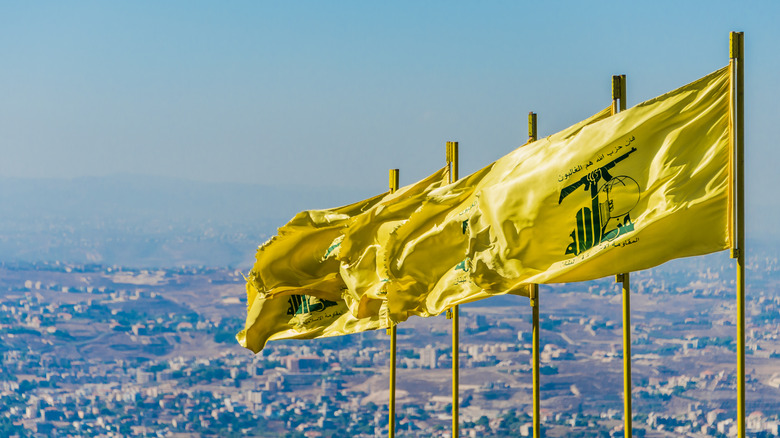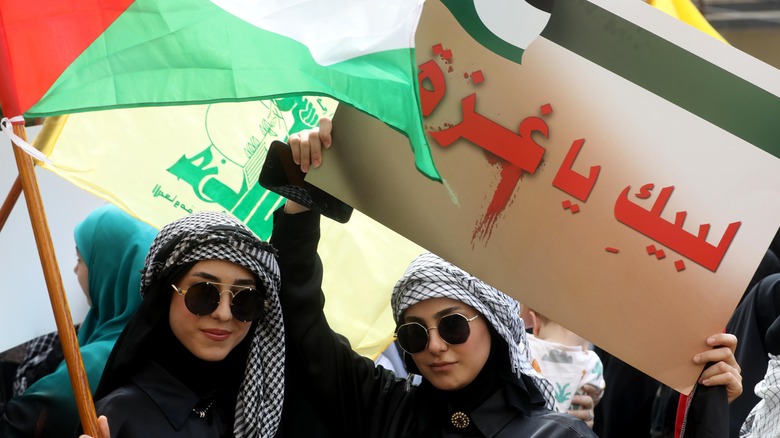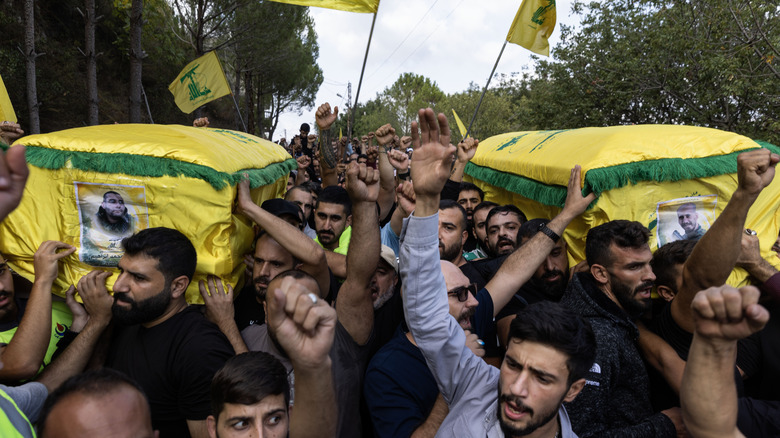What Is The Militant Group Hezbollah?
The Islamic terrorist group Hamas, active since the 1980s, carried out the surprise attack on Israel that initiated the 2023 war between the two. This focused attention back on Israel and its neighbors throughout the Middle East, and terrorist groups throughout the region came under renewed public scrutiny. The comparatively newly formed Islamic State of Iraq and the Levant (ISIL) saw its power in Iraq and Syria dwindle after its military defeat in 2019, though it still maintains a presence in these regions. In 1979, the U.S. State Department designated the Syrian government itself a State Sponsor of Terrorism itself. Same goes for the Iranian government in 1984.
Connected to all these groups and governments in one form or another sits the Lebanon-centered Hezbollah, which took root in the country during its protracted 15-year civil war from 1975 to 1990. Per the Middle East Research and Information Project (MERIP) and Migration Policy Institute, the conflict left almost 200,000 dead, left hundreds of thousands without homes and driven into poverty, and forced between 600,000 and 900,000 people to flee the country. Hezbollah arose from this destruction and chaos beginning with suicide bombers and car bombs against foreign embassies, as the Council on Foreign Relations describes. The United States officially labeled it a terrorist organization in 1997. Like many terrorist organizations, it harbored pretensions of political legitimacy. Now, it operates a Shiite Muslim Lebanese political faction, has strong ties to Syria, and receives military support from Iran.
Birthed in the Lebanese Civil War
As the Middle East Research and Information Project (MERIP) outlines, Lebanon in 1975 was a place of deep economic and social stratification that cut across various religious groups — 17 different religious sects, in fact, including Orthodox Christian groups, Sunni and Shiite Muslims, Druze, and more. At the same time, the country played host to 300,000 Palestinian refugees from the 1967 Arab-Israel Six-Day War, a conflict that carries over to the present in the form of disputed Palestinian-Israeli borders. On top of all this, Lebanon's then-top political parties — the Maronite Christian Phalangist Party and Syrian Socialist Nationalist Party — cut across volatile nationalistic, ethnic, and religious groups.
And so, in 1975 gunmen opened fire on Phalangist leader Pierre Gemayel as he left church. In retaliation, Phalangist gunmen attacked a busload of Palestinians in Lebanon's capital, Beirut. This kicked off 15 years of bloody violence that roped countless groups and countries into the mix, including Syria, France, the U.S., and Israel. In response — and influenced by Iran's 1979 Islamic Revolution — an Islamic militia named Hezbollah (the "Party of God") arose in Lebanon in the early 1980s. Iran funded them from the get-go. By 1983 it had bombed Beirut's U.S. embassy, bombed U.S. marine barracks, and, as a Director of National Intelligence's Hezbollah Timeline shows, kidnapped 29 Americans. In 1985 the group released a manifesto demanding the destruction of Israel.
Rise of a terrorist organization
Throughout the rest of Lebanon's Civil War, Hezbollah grew in power as its terrorist network spread and its violence continued. Throughout the 1980s, Hezbollah's activities spread internationally to Kuwait, Germany, Greece, France, Italy, and even Thailand, largely in the form of hijacked planes. In 1984, Hezbollah once again targeted Beirut's U.S. embassy via a car bomb that killed dozens.
In 1989 the Taif Accords were signed and ratified, forming the modern Lebanese government defined as "Arab in belonging and identity," and the Lebanese Civil War came to an end in 1990. Two caveats, however, empowered Hezbollah over other groups, leading it toward its 2018 designation as "the world's most heavily armed non-state actor," per the Center for Strategic and International Studies. Firstly, Syria was granted guardianship over Lebanon, which proved disastrous following the rise of Syrian dictator Bashar al-Assad in 2000. A 2022 report from the United Nations Human Rights Council report said that as of 2021, over 300,000 of his own citizens were killed from the conflict that began with the 2011 Syrian revolution. Secondly, all Lebanese militias had to disarm — except Hezbollah.
Two years later in 1992, Hezbollah bombed the Israeli embassy in the Argentinian capital of Buenos Aires. That same year, members of the group donned suits and won eight seats in the Lebanese parliament. Two years later, in 1994, the faction bombed the Israeli embassy in London and a Jewish community center in Buenos Aires. In 1997 the U.S. officially designated the group a terrorist organization.
Ongoing ties to Syria and Iran
Hezbollah remained somewhat quiet until the mid-2000s. Then in 2005, the Council on Foreign Relation says that Hezbollah — possibly working with the Bashar al-Assad-run Syrian government — assassinated beloved Lebanese Prime Minister Rafiq Hariri. The politician was devoted to peaceful reconstruction and diplomatic dialogue and said things like "countries are not built on fanaticism, extremism, and egocentric attitudes," per the Atlantic Council. By 2011, the Middle East's pro-democratic, anti-government Arab Springs uprising — which led to the still-active Syrian Civil War — saw Hezbollah send thousands of soldiers to assist al-Assad, further cementing Hezbollah's connections to Syria's dictatorship.
Meanwhile, Hezbollah maintained close ties to its original funder, Iran, whom Counterterrorism Ethics says also funds Hamas. According to Western officials, many of the weapons that Hezbollah has since brought to bear against Israel — like anti-armor weaponry — trace back to Iran (per the Council on Foreign Relations). To make matters even more entangled and dangerous, it's believed that Syria facilitates the transfer of such weapons from Iran to Lebanon, in exchange for agreements of continued support.
Meanwhile, the Director of National Intelligence's Hezbollah Timeline depicts numerous ongoing Hezbollah attacks across the '00s in places like Azerbaijan, Cyprus, and Egypt. In 2011, a United Nations tribunal finally indicted four Hezbollah members for the 2005 assassination of Prime Minister Harari. In 2012 Hezbollah suicide bombers targeted Israeli tourists in Bulgaria. In 2013, the European Union officially joined the U.S. in declaring Hezbollah a terrorist organization.
'The world's most heavily armed non-state actor'
At present, Hezbollah is stronger than ever. The Council on Foreign Relations says the groups retain's control over Lebanon's Shiite Muslim majority areas, largely from the middle of the country south to Israel, including the capital Beirut along Lebanon's coast and the eastern Bekaa region. It also continues to operate internationally across Europe, Africa, and the Americas, even while it participates in parliament back home. In addition to maintaining strong ties with Syria and retaining military backing from Iran, funding also travels back to Hezbollah from both legitimate and illegal businesses worldwide. Meanwhile, Hezbollah continues to be vocal about Israel and the United States being its chief enemies.
On that note, many have expressed concern over Hezbollah's potential involvement in the ongoing conflict between Israel and Hamas. As NBC News reports, Hezbollah claims responsibility for rockets shot at Israel from Lebanon during the conflict, saying not that it supports Hamas, but rather "the victorious Palestinian resistance and the struggling and patient Palestinian people." At this point, many Hezbollah troops are combat veterans who have been "bloodied" by active warfare, which — when taking Hezbollah's Iran-supplied weaponry into account — could prove catastrophic for the entire region, particularly Lebanon and Israel. In fact, Hezbollah alone could prove more difficult to fight than Hamas.
Speaking of this potentiality, National Security Council spokesperson John Kirby said, "The United States is ready to take action should any actor hostile to Israel consider trying to escalate or widen this war."
